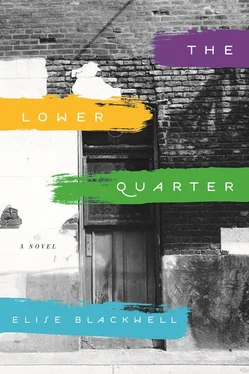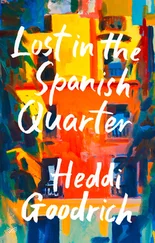Both before the storm and after the storm, she dwelled mainly in after Belgium : her daily routines, the people and shops of lower Decatur, her weekly trip by foot and then streetcar to Audubon Zoo, where sometimes she met Clay but most often did not, followed by a rest in front of Bird Island, which Clay, whose family had lived in New Orleans since forever ago, called Ochsner Island. And her work — her work had come after and now occupied most of her life.
There were times, though, when she skipped right over Belgium and allowed herself to think, for short spans, of before . Her memories of her father were from before. Most were fragments — wispy images with the quality of a morning dream just before waking. Even those few memories that were crisp were isolated. Single images: the side of her father’s face, his hand turning the page of a book, the smell of leaves on his shirt. Only one was more extended, possessing the quality of narrative.
A beach near a city, a vacation. The only time in her life when she will be a tourist and not some other category of migrant. The ocean is flat: a thick stripe of turquoise water close to shore and then the wide block of dark blue, the line dividing them clean and straight. A child’s painting of the sea. Unlike the pebble beaches closer to where they live, this one is sand, and her father shows her how wet the sand needs to be to make a fort. The one they build is large, protected by multiple sea walls. As they finish the tide breaks over the wall farthest out, filling the moat between it and the next. She sees, then, what will happen.
“The people will have to move.” Her voice is somber. She looks to her father.
“Maybe that will be a good thing,” he says. “They thought they wanted to live in a fort, but the rooms are very cold and the floors are very hard, and when they move they will find that they like their new home much better.”
Later in the day they are in the city near the beach, walking hand in hand in a museum. Her father is telling her about the statues in the Greek wing, how once upon a time their irises were green and brown, how they were brightly painted from head to foot, how now they are just silhouettes, bland copies of their former selves. Not what the artists meant for them to be at all.
“Now they live in a fort,” she says in her child’s voice, “where the walls are cold and the floors are very hard.”
Her father kneels, looks at her as though seeing something previously unnoticed, kisses the top of her head.
Yet, memory being untrustworthy, she doubted this recollection. There had been a photograph of that morning on the Dalmatian coast, which she had seen several times after the excursion itself, seen while her father was sick and again after the cancer spread from his bladder and killed him. As much as she wanted the memory of her father emerging from the turquoise water to be direct, she admitted to herself that it may have been the photograph she remembered. A memory of a representation — not direct and so not real.
The conversation about the color of the statues’ eyes, though, that she remembered herself and not from a photo. But it was entirely possible that the conversation had not happened the same day or the same week or even the same year of the trip to the beach. It was possible that it hadn’t even happened in a museum but over a book opened on their little table at home. Before he got sick. Before the bad time. Before Belgium.
She picked up the phone and dialed Clay’s number, wishing that the sequence of digits wasn’t rote after all this time. Yet there were few numbers — none — to displace the knowledge. Clients’ numbers she called only once or twice so did not memorize, and there was no one else she called.
When Clay did not answer, she hung up without leaving a message. The information she had to give him, if he didn’t already know it, and the questions she knew she was supposed to ask him should not be entrusted to a machine. She would eventually have to see him.
She called the couple in Italy, not accounting for the time difference. They were grateful to be wakened when she told them yes, she would go see about their work. And yes, their cat.
She trembled when she hung up, bracing her fingertips on the counter of the narrow galley kitchen. She had not meant to make the call, had not known in advance that she was going to accept their offer. Indeed, she had decided as soon as she had first talked to them that she would not take the job. She delayed only out of respect for what they did — to make them think that she had at least deliberated, perhaps to give them another name or to offer to look at their work if they could hire someone else to retrieve it and bring it to her. She did not care to go into other people’s houses, she had planned to explain, and she was no good with cats.
Though her back was to the small painting in her sitting area, she could feel it there — like being in the room with another living thing, an animal unseen but whose sentience you feel. She carried it now to her too-soft sofa, loosened the twine, opened the squares of smooth brown paper, revealed paint and line and figure.
The first time she had seen the painting, grime had obscured its colors. She’d had to strain, her head twisted unnaturally to the left, to see the human figure — a young woman — waiting to trade one life for another. It was then, in that horrible and undeniable moment, that she had first experienced the curiosity that would become her vocation. Lying on the floor, level with the painting slanted against the wall, her head bent away from what was happening to her, she had wondered how a painting might be cleaned, its colors restored and released.
Eli
When he was a younger man, Eli loved not only to travel but the travel itself, the flying from place to place, inhabiting a space between lives and friends and countries. He was a nationalist, yes, in that he believed in independence for his people, his home. Personally, though, he identified as something else. Cosmopolitan was a word pretentious to him even back then, when, feeling as untouchable and certain as all bright and handsome young men, he’d been at his most pretentious.
Yet there was also a simpler appeal to travel: the coincidental crossing of lives — whom you might meet. In his fantasies it was often a beautiful woman who shared his tastes in paintings and books and politics. But sometimes he imagined sitting in a window seat and looking up to find an artist he admired storing his satchel in the overhead compartment, taking the seat next to him. Eli would imagine how he would hold his body next to the famous one, respecting his privacy too much to speak but following the illustrious gaze with his own, seeing what it landed on and for how long, as though perspective were a skill that can be learned through observation of another rather than through study.
While Eli had never had the good fortune to sit next to either a woman or a painter worthy of a pedestal, knowing that it could happen was still a pleasure. And often enough he sat next to someone who was at least interesting, or who could recommend a good park or bar in the city he was heading to, or who told him some strange fact he found himself pulling out at a party a week later. If nothing else, he’d learned that most people hold jobs you’ve never heard of or at least never thought about doing yourself. On various flights he’d been seated next to an actuary, a man who investigated train wrecks, a woman who managed a factory in which single-use coat hangers were manufactured for (as she called them) high-volume department stores, a couple who had started a company that arranged food for photo shoots, a pro bowler, and a guy who called himself a user-experience designer. “I make it more pleasant for people to interact with things,” he’d said. “My favorite work is with board games, but I’m working on cash machines right now. You take the work you can get.”
Читать дальше












